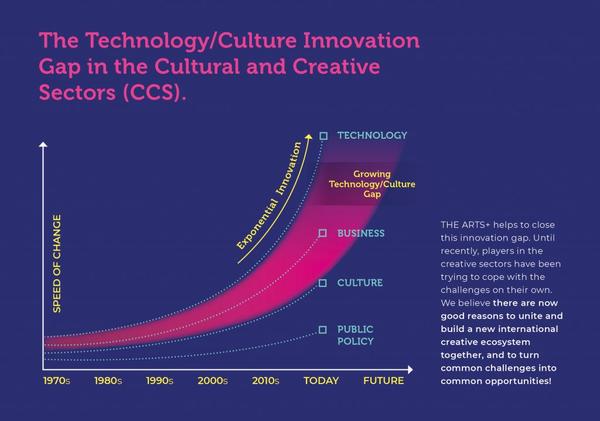THE ARTS+ Innovation Summit: The bigger Picture – How can the cultural and creative Sectors bridge the innovation gap?
WHY do we think it’s time for THE ARTS+ Innovation Summit?
Digitisation and new technologies such as artificial intelligence, virtual and augmented reality, blockchain, 3-D printing and big data can trigger innovation at all levels of the creative sectors. Yet we observe a growing gap between technology and culture. Culture, and with it society, are struggling to catch up with the exponential speed of technological innovation.

© THE ARTS+/ Frankfurter Buchmesse GmbH
At present, it seems that each player – and each sector – is grappling on its own with these innovation challenges. But what if there was a wider European innovation support ecosystem – one that cut transaction costs and boosted the creative sectors to a digital level? What if the creative sectors had all the opportunities that befit the rank as a European key sector? What are the best ways to support tech-triggered innovation in the cultural and creative sectors (CCS)?
The creative sectors are very good at communicating other people’s messages and stories. Yet when it comes to articulating their own interests, their voice is surprisingly weak. This has a lot to do with fragmentation, as the majority of creative players are micro-entities. On top of that, the creative sectors are not (yet) united, “they still often work in sectoral silos.” [1]
Still, European players have done a great job in the past decade by arguing the social, economic and cultural relevance of the creative sectors in several studies. In 2016, the European Parliament demanded – finally! – a coherent policy for the creative sectors as a key European industry: “What we need is a comprehensive industrial strategy at the European level that will take all specific characteristics of cultural and creative industries into account, and will turn challenges like digitalisation (…) into new growth and job opportunities.”[2]
This report is a rare and beautiful example of what can happen if industry and culture put their heads together – it was written jointly by the Industry (ITRE) and Culture Committee of the European Parliament. But to create a coherent policy, what is needed first and foremost is a strong voice of the CCS. This is currently still lacking [3].
WHAT do we intend to do about this challenge at THE ARTS+ Innovation Summit?
THE ARTS+ Innovation Summit aims to explore structural innovation barriers, and search for possible solutions for adequate innovation support ecosystems – in Europe, but also on a national scale. We are convinced that the creative sectors have many innovation needs in common. New technologies trigger innovation on all levels, be it content, products, services, processes, methods, organizational cultures, business models, value networks, skills, competences and more. When we say ”CCS” we don’t think along the lines of “commercial” or “publicly funded”, we think of creative people and the value they generate. We know there is a lack of knowledge – and awareness – of these very special innovation processes. And for that reason there’s also a lack of coherent innovation support frameworks.
We agree with Mariana Mazzucato, author of The Entrepreneurial State(Öffnet neues Fenster), when she highlights the need to “develop a new industrial policy (…) in which the state (plays) a leading entrepreneurial role in achieving innovation-led growth.” (p. 15) Yet growth is not the only potential benefit. Values, skills and competences are equally important.
And HOW do we want to achieve our goal?
In 2017 we gathered a small, yet influential international network of more than 80 diverse individuals and institutions, ranging from policymakers, researchers, creative entrepreneurs, creators, sector players and intermediaries such as cluster organisations, associations or institutions like OECD and the German Commission for UNESCO. The event laid the ground for THE ARTS+ Innovation Summit in 2018, a high-ranking gathering of passionate pioneers…
This year, the extended network will aim to identify common innovation barriers and explore core demands for innovation support for the creative sectors as a whole. In addition, we will take a closer look at Cultural Heritage and Book Publishing and explore their sector-specific characteristics, as well as any overlaps with other creative sectors.
[1] “Mapping the Creative Value Chains”, study commissioned by the EU Commission (DG EAC), 2017, p. 304, https://publications.europa.eu/en/publication-detail/-/publication/4737…(Öffnet neues Fenster)
[2] European Parliament Report: „On a coherent EU Policy for the CCI“, 2016, http://www.europarl.europa.eu/sides/getDoc.do?pubRef=-//EP//TEXT+REPORT…(Öffnet neues Fenster)
[3]“Mapping the Creative Value Chains. A study on the economy of culture in the digital age”, KEA/IDEA/SMIT, commissioned by the European Commission/ DG EAC, 2017, p. 305, http://www.keanet.eu/wp-content/uploads/Final-report-Creative-Value-Chains.pdf(Öffnet neues Fenster)
The Partners
Funding Partners:
The Innovation Summit is organized as part of ALDUS(Öffnet neues Fenster), the European Book Fairs’ Network, and is co-funded by the Creative Europe programme of the European Union(Öffnet neues Fenster).
Strategic & Funding Partners:
- Fitzcarraldo Foundation(Öffnet neues Fenster)/ ArtLab(Öffnet neues Fenster) (Italy)
- European Creative Business Network (ECBN)(Öffnet neues Fenster)
- ALDUS – European Book Fairs’ Network(Öffnet neues Fenster)
Programme Partners:
- Europeana (Netherlands)(Öffnet neues Fenster)
- Federation of European Publishers(Öffnet neues Fenster)
- German Publishers and Booksellers Association(Öffnet neues Fenster)
- NEMO, Network of European Museum Organisations(Öffnet neues Fenster)
- Studies in Media, Innovation and Technology (SMIT(Öffnet neues Fenster)), research group at the Vrije Universiteit Brussel (VUB) & part of imec(Öffnet neues Fenster), Flanders/ partner in the EU-funded project MediaRoad(Öffnet neues Fenster) (Belgium),
Network Partners:
- Fundación Germán Sánchez Ruipérez (Spain)(Öffnet neues Fenster)
- EU Commission, Directorate General for Education and Culture (DG EAC), Creative Europe Programme, (Belgium)(Öffnet neues Fenster)
- German Commission for UNESCO(Öffnet neues Fenster)
- I3, a coordinated support action (CSA) funded by the European Commission under the European research funding programme Horizon2020; (represented by T6 Ecosystems)(Öffnet neues Fenster)
- New European Media (NEM)/ EU-funded project VitalMedia(Öffnet neues Fenster)
- World Association of Newspapers and News Publishers(Öffnet neues Fenster) (WAN-IFRA)/ Global Alliance for Media Innovation(Öffnet neues Fenster)
- Deutscher Museumsbund e.V.(Öffnet neues Fenster)
